![]()


Khana Khane Kay Tarikay Aur Jadeed Science
Prophet Muhammad: Normal Family Relations
After marriage women need to adjust to the demands of their new status. The couple would have known each other very well and they would be familiar with what each of them requires for a happy and settled home life. It is often the case that families stay together because of public duty, or because a break-up is too costly, socially or materially.
Prophet Muhammad (peace be upon him) lived with his first wife, Khadijah (Radi Allahu anha), for 25 years. After her death, he married several wives, but he was with the first of these, Sawdah (Radi Allahu anha), for several years before he married again. All his marriages were necessitated by legislative, social, or political reasons. This means that each one of his wives realized at the time of her marriage that she was being married to a person who received direct revelations from God. This was a far more honorable position than that of any king or emperor. How could they adjust to their new positions? What sort of training did they need for such an adjustment?
Umar ibn Al-Khattab (Radi Allahu anhu) tells us of an occasion when he was at home thinking about a problem he was facing when his wife asked him what was on his mind. He told her that it was none of her business. She said: “How could you say that when your daughter, Hafsah, would ask her husband, the Prophet, about his affairs and would object to something he might wish?” Shocked, Umar (Radi Allahu anhu) went to his daughter and asked her if that was true. She confirmed that it was. Umar (Radi Allahu anhu) counseled his daughter not to do this again, reminding her that should she be divorced, her position with God and the Muslim community would be greatly undermined. Umar (Radi Allahu anhu) further asked another of the Prophet’s wives, Umm Salamah (Radi Allahu anha), about this, because she was related to him. She confirmed it and he tried to counsel her, but she said: “How strange that you, Umar (Radi Allahu anhu), are trying to interfere between God’s messenger and his wives?”
What this tells us is that life in the Prophet’s home was just as normal as it was, and remains, in most families. A married couple may have the occasional disagreement, and if a wife feels that she did not receive what she wants, she may be upset with her husband. She may object to a decision he might have taken and tries to persuade him to change it. If she fails, she may decide not to speak to him, or she may sulk for a while. A little later, things may sort themselves out. The fact that the other party was God’s messenger did not affect this relationship. They looked at it as a normal married life. Thus, the position of the Prophet as God’s messenger disappears, and what is left is the relationship between a man and his wife.
In the Prophet’s case, this was governed by his advice to us all: “The best of you is the one who is best to his wife and family. I am the best of you to my wives and family.” This Hadith sets a principle that the best of all people are those who are kind and compassionate in their dealings with their wives and children. It also sets a practical example that we should all follow. This was the example provided by the best person to have ever lived on earth, Muhammad (peace be upon him).
– by Adil Salahi
- October, 12
- 3024
- Prophet Character
- More
Holding On To Burning Coals
The Prophet (peace be upon him) said: “There will come a time of patience when the one who adheres steadfastly to his religion will be like one who holds a burning coal.” (Al-Tirmidhi, no. 2260, authenticated by Al-Albani)
Strange, strange times we are passing through. In one part of the world, a man may grow up in a land where he has never heard of anything except Islam; while in another place, a woman may struggle and face isolation while trying to adhere to this ‘never-heard-of strange’ religion. The former may spend his life praying, fasting, and giving charity, while the other may die in persecution and violence. Most of us will lie in shades of gray between these two black-and-white realities.
Without a doubt, several Muslims around the world are going through severe trials. They are being pressured to accept beliefs, systems, and lifestyles that other societies have termed ‘ideal’ instead of the Islamic ones. A man sporting a beard may become a terror suspect, women should remove their veils to either be ‘liberated’ or be part of a secular society, and youth cannot be ‘cool’ unless they drink in pubs and lose their virginity before the marriage. What do you do when the world tells you to be ashamed of your identity and the path that you know with full conviction is true? What do you do when holding on to your faith is akin to holding on to burning coals?
The first thing we should do when we face such – or any – trouble turns to Allah for help. Address your du’a to him. He has heard us and answered our prayers in our most difficult times in the past, He provides us and has given what we didn’t even ask for, so to Him we need to turn – and expect – help.
Realize the futility of what is being propounded. Ideas, values, beliefs, and systems keep changing in today’s world. What was good yesterday, is bad today; what is bad today, is good tomorrow! A fine example is the financial crisis. Yesterday, everyone in America was laughing at those who preferred saving and not taking loans more than their income. The ‘ideal’ thing to do then took mortgage loans; spending went up to 135 percent of a person’s salary! Today, after the crisis has hit, people are saying, saving was the right thing to do!
Islam’s teachings always remain the same. Its principles never change. Any path that is different from that of Islam is bound to fail. In America, those who did not take interest-based loans and did not spend extravagantly are better off in the current crisis. In short, those who stuck to Islam, despite what people around them said during that time, have emerged victorious.
The examples are too many, but the point is: don’t be blinded into confusion during Fitan (trials). Be strong and stand firm, because, by Allah, you are upon the truth. At work, and at social gatherings, your adherence to Islam may be questioned and ridiculed, but that should not deter you. Go back to the Qur’an and Sunnah, read them for comfort and your faith will automatically increase. Reflect on the verses of the Qur’an, and reflect on the evidence Allah gives to prove the truthfulness of His Message. Is there any uncorrupted truthful divine book with so many miracles present today? Has anyone ever brought forth a book similar to the Qur’an?
The more you learn about Islam, the more your faith in it will increase In Sha Allah. In fact, Allah revealed the Qur’an in stages to Prophet Muhammad (peace be upon him) to strengthen his heart. Learning will not be so fruitful unless we practice the knowledge we have. So the product of our knowledge should be righteous deeds.
Contribution Of Islam To The Human Thought
To arrive at a correct appraisal of the Prophet’s (peace be upon him) contribution to human thought, one has to view it in the background of the history of the world as a whole. That would reveal that this unlettered dweller of the desert of Arabia, who was born in the “dark ages” some 1,400 years ago, was the real pioneer of the modern age and the true leader of humanity. He is not only the leader of those who accepts his leadership, but also of those also who do not acclaim him as such: even of those who denounce him! The only difference is that the latter are unaware of the fact that his guidance is still imperceptibly influencing their thoughts and their actions and is the governing principle of their lives and the very spirit of modern times. It was Prophet Muhammad (peace be upon him) who turned the course of human thought from superstition-mongering, love for the unnatural and the inexplicable, and monasticism towards a rational approach, love for reality, and a pious and balanced worldly life.
It was he who, in a world that regarded only supernatural happenings as miracles and demanded them for the verification of the truth of a religious mission, inspired the urge for rational proof and faith in them as the criterion of truth. It was he who, in place of baseless speculation, led human beings to the path of rational understanding and sound reasoning on the basis of observation, experiment, and research. It was he who clearly defined the limits and functions of sense perception, reason, and intuition. It was he who brought about a rapprochement between spiritual and material values. It was he who harmonized faith with knowledge and action. It was he who created the scientific spirit with the power of religion and who evolved true religiosity on the basis of the scientific spirit. It was he who eradicated idolatry, man-worship, and polytheism in all forms so thoroughly, and created such a firm faith in the unity of God that even those religions which were based entirely on superstitions and idolatry were compelled to adopt a monotheistic theme. It was he who changed the basic concepts of ethics and spirituality.
To those who believed that asceticism and self-annihilation alone formed the standard of moral and spiritual purity -that purity could not be achieved except by running away from worldly life, disregarding all the urges of the flesh, and subjecting the body to all types of tortures – it was he who showed the path or spiritual evolution, moral emancipation, and attainment of salvation through active participation in the practical affairs of the world around them. It was he who brought home to man his true worth and position; those who acknowledged only a God incarnate or a son of God as their moral preceptor or spiritual guide were told that a human being like them, having no pretension to godhead, could become the vicegerent of God on earth. It was he who stressed the point that no person could claim holiness, authority, or kingship as a birthright and that no person could be born with the stigma of untouchability, slavery, or serfdom on his person. It was he and his teachings that inspired the thoughts of the unity of mankind, equality of human beings, true democracy, and real freedom in the world. Leaving aside this realm of thought and moving a bit further, one will find countless practical results of the leadership of this unlettered person firmly impressed with the laws and ways of the world.
So many principles of good behavior, culture, civilization, purity of thought and deed, which are prevalent in the world today, owe their origin to him. The social laws which he gave have infiltrated deep into the structure of human social life, and this process continues up to this day. The basic principles of economics which he taught have ushered in many a movement in world history and hold out the same promise for the future. The laws of governance which he formulated brought about many an upheaval in political notions and theories of the world and continue to assert their influence even today. The fundamental principles of law and justice which bear the stamp of his genius have influenced, to a remarkable degree, the administration of justice in the courts of nations, and form a perpetual source of guidance for all legists to come. This unlettered Arab was the first person who set in motion for the first time practically the whole framework of international relations and regulated the laws of war and peace. For no one had previously even the remotest idea that there could be an ethical code of war or that relations between different nations could be regulated on the grounds of common humanity.
5 Hazar Farishtay Maidan-e-Jang Mae
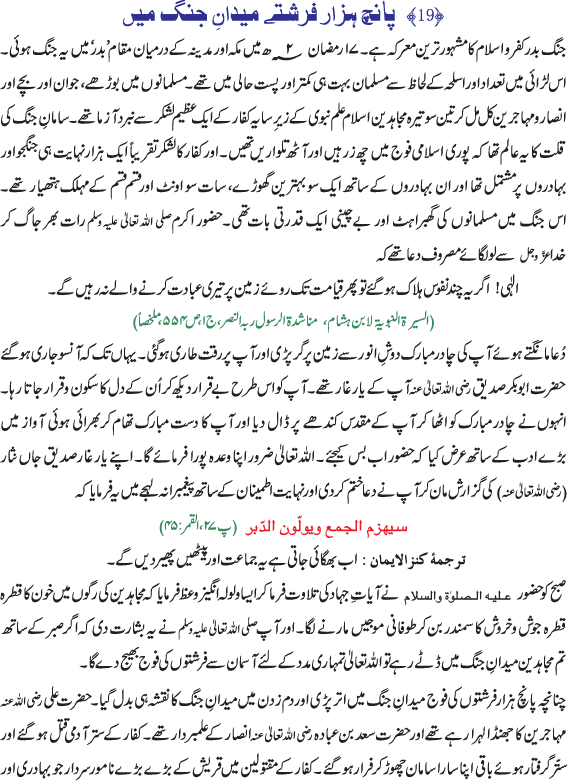
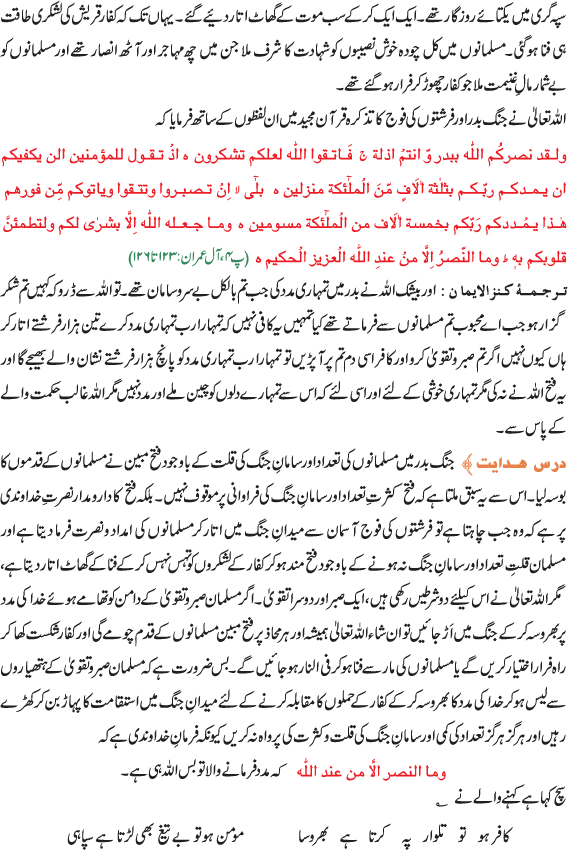
5 Hazar Farishtay Maidan-e-Jang Mae
Blessings Of A Simple Marriage
A man came to Sufyan Bin Uyainah (may Allah have mercy on him) and complained about his wife. “I am the lowest and most despicable thing to her,” he said. Sufyan lowered his head for a few moments and asked, “Perhaps you wanted her in order to better your status?” The man said, “Indeed, Abu Muhammad.” Sufyan replied, “Whoever goes for glory will be tested with humiliation; whoever goes for wealth will be tested with poverty; but whoever goes for religiousness, Allah will bring together for his glory and wealth with the religion.”
Sufyan then mentioned his own story to the man. “We were four brothers,” he said. “Muhammad, ‘Umran, Ibrahim, and I. Muhammad was the eldest, ‘Umran was the youngest, and I was in the middle. When Muhammad wanted to marry, he desired status and married a woman of higher standing, so Allah tested him with ignominy. ‘Umran desired wealth, so he married a richer woman and Allah tested him with poverty, as (her family) took everything from him and gave him nothing.”
“I pondered over their situation,” Sufyan continued. “Once when Mu’ammar Bin Rashid came to us, I consulted him and told him the story of my brothers. He reminded me of the Hadith of Yahya Bin Ja’dah and the Hadith of Ayesha.” The first Hadith states that the Prophet (peace be upon him) said, “A woman is married for four things: her religion, her status (lineage), her wealth or her beauty; so take the religious one and be successful.” (Al-Bukhari and Muslim) The second Hadith of Ayesha states that the Prophet (peace be upon him) said, “The most blessed woman is she who is easiest to maintain.” (An-Nasa’i)
“Thus,” Sufyan said, “I chose (to marry a woman of) religion and with a modest dowry, in accordance with the Sunnah of Allah’s Messenger (peace be upon him) and Allah gave me status and wealth along with the religion.” – Abu Nu’aym, Hilyatu Al-Awliya (7/289, 290)
Note: The second Hadith has been graded weak by scholars. However, scholars point out there is another narration that supports and adds to its meaning, which states: “It is from the good qualities in a woman that she (is taken in marriage with) an easy dowry, an easy proposal (via her guardian) and an easy womb (i.e. she is fertile and bares children without difficulty).” (Musnad Ahmad)
- October, 8
- 3273
- Human Rights
- More
Barsisa – The Worshiper
Barsisa, a monk worshipped Allah Alone for 60 years. Satan tried hard to seduce him, but could not. He went to a woman and touched her with evil (maddened her). The woman had brothers who were visited by Satan who told them to take her to that monk to receive treatment and cure.
They took her to the monk and he treated her. Afterward, she stayed for a while in his cell (house). One day, he was attracted to her and committed adultery with her.
She got pregnant and he killed her (to conceal his first crime). Her brothers came (after knowing the matter) and Satan appeared again for the monk and said: “I am your friend, I did not find a solution or way to mislead you, but (finally) I set you up. So, obey me and I will save you from this. Prostrate yourself before me and you will be saved.” The monk did so. Then, Satan said:
“…I am free of you, I fear Allah, the Lord of the ‘Alamin (mankind, jinns and all that exists)!” (Qur’an, 59:16)
Ibn Katheer mentions the above in the explanation of the verses:
“(Their allies deceived them) like Shaitan (Satan), when he says to man: “Disbelieve in Allah.” But when (man) disbelieves in Allah, Shaitan (Satan) says: “I am free of you, I fear Allah, the Lord of the ‘Alamin (mankind, jinns, and all that exists)!”
So the end of both will be that they will be in the Fire, abiding therein. Such is the recompense of the Zalimun (i.e. polytheists, wrong-doers, disbelievers in Allah and in His Oneness, etc.).” (Qur’an, 59:16,17)
– Stories of the Qur’an by Ibn Katheer, Translated by Ali As-Sayed Al- Halawani
Be The Driving Force Of Good
ASHAAB As-Sabt, the people of the Sabbath (Saturday), was townsfolk from the Children of Israel who were tested with the Sabbath, the day when they were to leave their worldly affairs and devote themselves to the worship of Allah. All week long, they would go fishing, with the scant return. But on Saturdays, when they were required to put aside their activities, the fish would come in abundance. A test from Allah!
“And ask them (O Muhammad, peace be upon him)) about the town that was by the sea; when they transgressed in the matter of the Sabbath ( i.e. Saturday): when their fish came to them openly on the Sabbath day and did not come to them on the day they had no Sabbath.
Thus We made a trial of them for they used to rebel against Allah’s Command (disobey Allah.)” [Qur’an, An-Nisa 4:154]
A group of the townsfolk transgressed, not satisfied with Allah’s commandments they devised a scheme to bypass the commandment. They would put out their fishing nets on Friday, and then on Sunday they would come and pick the nets up. Now all the Saturday fish would be caught.
The townsfolk divided into two groups when they saw the grave evil and sin that was befalling them. One of them tried to advise the transgressors and warn them of the horrific consequences of their action – commanding the good and forbidding the evil.
Thinking they had no responsibility for what was taking place, the other group just went about minding their own business, holding that Allah would eventually destroy the sinners.
And when a community among them said: “Why do you preach to a people whom Allah is about to destroy or to punish with severe torment?” Listen carefully to the reply of those callers to the obedience of Allah.
(The preachers) said: “In order to be free from guilt before your Lord (Allah), and perhaps they may fear Allah.” (Qur’an, 7:164)
In one sweep in the night, the punishment rained down and they were transfigured into pigs and monkeys.
Dear brothers and sisters, it is the nature of a human being to feel the need to do good or feel the drive to indulge in evil. Even if he or she were to be alone, deserted, and secluded, they would still feel the drive to do good or indulge in evil.
From here, it is a characteristic of this Ummah (Islamic nation) to not only do good ourselves, but we must encourage others to do good, we must be the driving force. And we must not only distance ourselves from vice, but we must forbid others from doing it also – we must act as the barrier between the evil and the men. The Qur ‘tells us that the winners, those that attain success, are those Muslim men and women who command the good and forbid the evil: Allah teaches us that He cursed nations before us because they lost this characteristic of encouraging good and forbidding evil:
[Those among the Children of Israel who disbelieved were cursed by the tongue of Dâwûd (David) and ‘Isa (Jesus), son of Maryam (Mary). That was because they disobeyed (Allah and the Messengers) and were ever transgressing beyond bounds. They used not to forbid one another from Al-Munkar (wrong, evil-doing, sins, polytheism, disbelief) which they committed. Vile indeed was what they used to do. (Qur’an, 5:78-79).
Maah-e-Muharram Kay Fayuz-o-Barakat
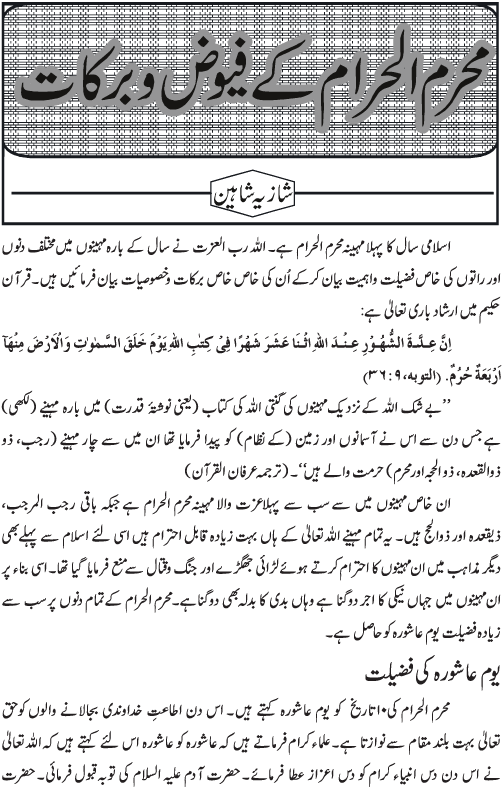
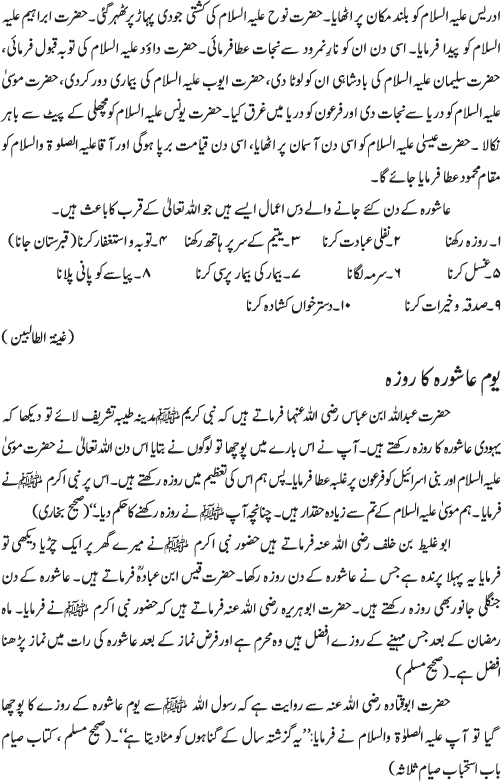
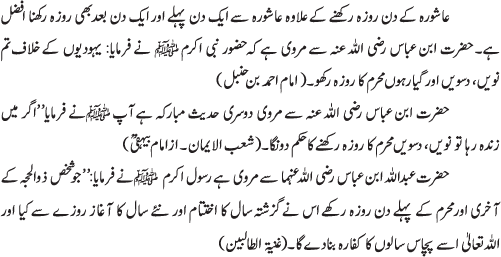
Maah-e-Muharram Kay Fayuz-o-Barakat
Muharram
Muharram is the month with which the Muslims begin their lunar Hijrah Calendar. It is one of the four sanctified months about which the Holy Quran says, “The number of the months according to Allah is twelve (mentioned) in the Book of Allah on the day He created heavens and the earth. Among these (twelve months) there are four sanctified.”
These four months, according to the authentic traditions, are Dhul-Qa’dah, Dhul-Hijjah, Muharram, and Rajab. All the commentators of the Holy Quran are unanimous on this point, because the Holy Prophet, Sall-Allahu alayhi wa sallam, in his sermon on the occasion of his last Hajj, declared: “One year consists of twelve months, of which four are sanctified months, three of them are in sequence; Dhul-Qa’dah, Dhul-Hijjah, Muharram, and the fourth is Rajab.”
The specific mention of these four months does not mean that any other month has no sanctity because the month of Ramadan is admittedly the most sanctified month in the year. But these four months were specifically termed as sanctified months for the simple reason that their sanctity was accepted even by the pagans of Makkah.
In fact, every month, out of the twelve, is originally equal to the other, and there is no inherent sanctity that may be attributed to one of them in comparison to the other months. When Allah Almighty chooses a particular time for His special blessings, the same acquires sanctity out of His grace.
Thus, the sanctity of these four months was recognized right from the days of Sayyidina Ibrahim, alayhi salam. Since the Pagans of Makkah attributed themselves to Sayyidina Ibrahim, alayhi salam, they observed the sanctity of these four months and despite their frequent tribal battles, they held it unlawful to fight in these months.
In the Shariah of our Noble Prophet, Sall-Allahu alayhi wa sallam, the sanctity of these months was upheld and the Holy Quran referred to them as the “sanctified months”.
Muharram has certain other characteristics special to it, which are specified below.
Fasting During the Month
The Noble Prophet, Sall-Allahu alayhi wa sallam, has said: ‘The best fasts after the fasts of Ramadan are those of the month of Muharram.”
Although the fasts of the month of Muharram are not obligatory, one who fasts on these days out of his own will is entitled to a great reward from Allah Almighty. The Hadith cited above signifies that the fasts of the month of Muharram are the most rewardable ones among the Nafl or voluntary fasts.
The Hadith does not mean that the award promised for fasts of Muharram can be achieved only by fasting for the whole month. On the contrary, each fast during this month has merit. Therefore, one should avail of this opportunity as much as he can.
The Day of ‘Ashurah’
Although Muharram is a sanctified month as a whole, yet, the 10th day of Muharram is the most sacred among all its days. The day is named ‘Ashurah’. According to the Holy Companion Ibn ‘Abbas, Radi-Allahu anhu. The Holy Prophet, Sall-Allahu alayhi wa sallam, when migrated to Madinah, found that the Jews of Madinah used to fast on the 10th day of Muharram. They said that it was the day on which the Holy Prophet Musa (Moses), alayhis salam, and his followers crossed the Red Sea miraculously and the Pharaoh was drowned in its waters. On hearing this from the Jews, the Holy Prophet, Sall-Allahu alayhi wa sallam, said, “We are more closely rotated to Musa, alayhi salam, than you,” and directed the Muslims to fast on the day of ‘Ashura’. (Abu Dawood)
It is also reported in a number of authentic traditions that in the beginning, fasting on the day of ‘Ashura’ was obligatory for Muslims. It was later that the fasts of Ramadan were made obligatory and the fast on the day of ‘Ashura’ was made optional. Sayyidina ‘Aisha, Radi-Allahu anha, has said:

